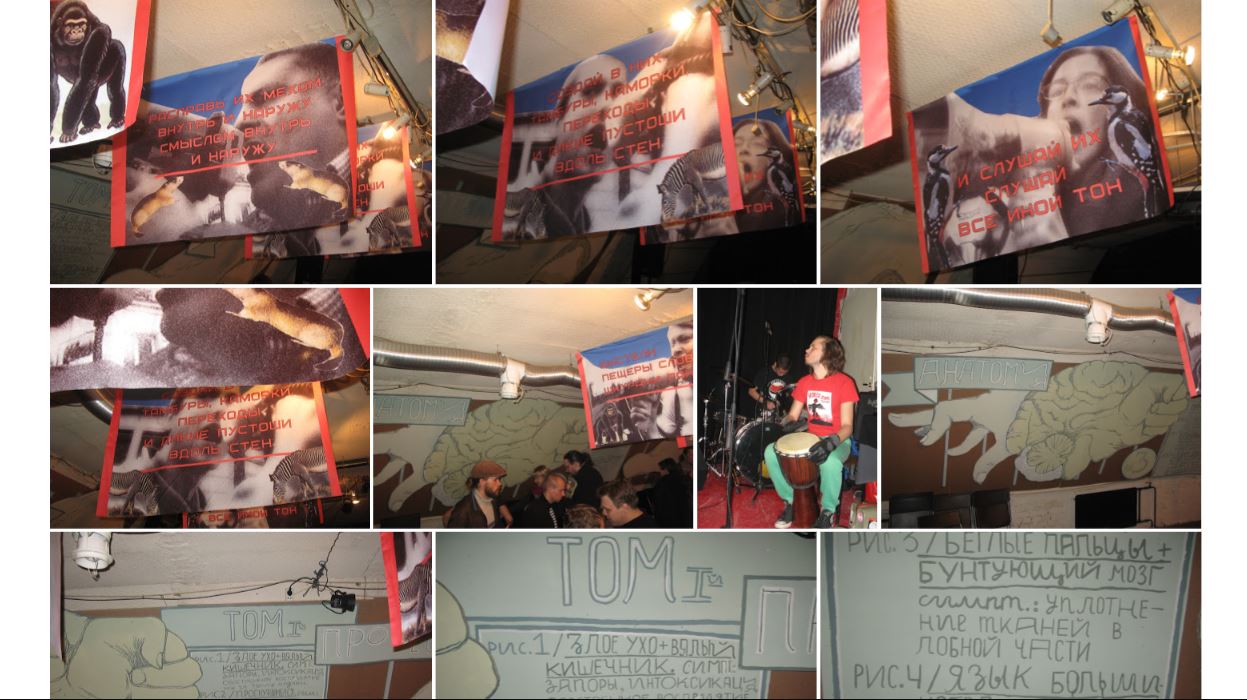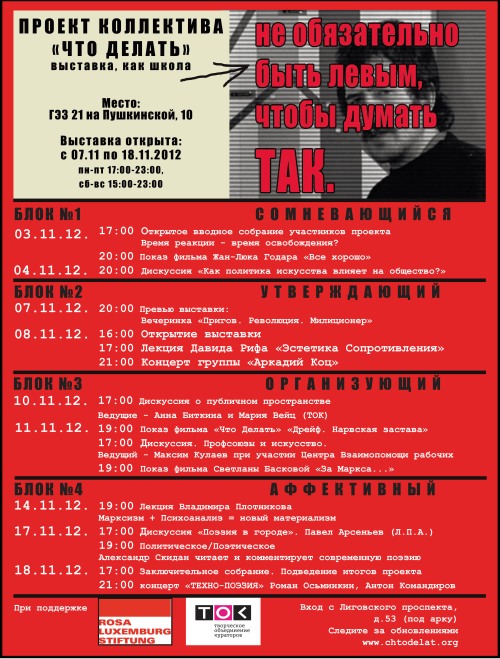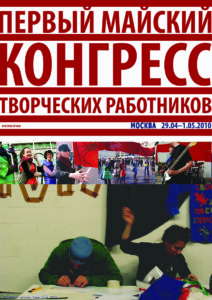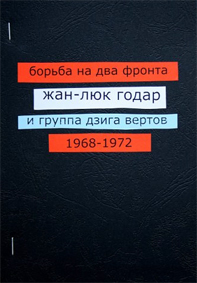You Don’t Have to Be Leftist to Think Like That.
An Exhibition as a School (2012)
GEZ-21, Pushkinskaya-10 Art Center, Petersburg
The line “You don’t have to be leftist to think like that” was uttered by a striking worker in Jean-Luc Godard’s 1972 film “Tout va bien”. Forty years later, it has the same ring as it did then: not as a depoliticizing slogan that abolishes a traditional way of marking political differences, but as a simple statement of the fact that leftist views and convictions have ceased to be a set of hackneyed ideologemes and are, rather, something basic to humanity’s survival.
Chto Delat starts from the notion that art and culture’s educational function are an essential aspect of its production of knowledge and meaning. Unlike other artists, who insist on art’s apolitical nature, Chto Delat has consistently upheld the idea that cultural production is implicated in the current political struggle and that cultural workers must constantly insist on the value of emancipatory politics and counteract culture’s commercialization.
In our exhibition projects we aim to create spaces and situations where audience and artworks engage with each other. In this project we want to turn the process of conceiving and producing an exhibition into a continuous series of workshops, seminars and round tables on art’s role in political development. We are confident of the project’s relevance for the current Russian conjuncture, in which the general public has shown greater interest in issues of political education and the desire to take responsibility for the country’s development. The project aims to equip participants with a set of creative tools for critically analyzing, understanding, liberating and transforming society.
But how can we achieve these aims given the absence of a civil society, at a time when the authorities show a flagrant disregard for both their own basic obligations and the law, thus untying the hands of the most reactionary forces and openly encouraging their violence?
It is a natural reaction to events in our country to come out against the authorities, join in the democratic demands of anti-government forces, and get involved in rallies and protest campaigns. But will anything change by endlessly chanting the mantra “The government has got to go”?
The question arises as to what kind of society can and must replace it. We believe that the most acute issue now is the development of an alternative public space for intellectual and political resistance. Obviously, this space can be generated only by a broad network of self-organized initiatives that require no external hierarchical coordination, because they will be based on the specific solidarity of cooperation.

Poster for “You Don’t Have to be Leftist to Think Like That”
This network must be recreated everywhere—in everyday life, at work, in the streets, at home. If this model of civil society is unable to achieve a critical mass of participants, superficial transformations of power will not lead to significant real changes. Culture and art have always played an essential role in man’s formation. They are our principal defense from the constant threat of barbarism. It is therefore necessary to fight for their values and oppose all forms of clericalism, bigotry, slavery and outright violence. The authorities understand this all too well and are thus carrying out a directed assault on the very idea of secular, critical and politically committed culture and education. Intellectual and research work, seriously underestimated by the opposition, can and should be a focus of the new mobilization as the unequal confrontation between state and society continues. To make this happen, we need to tackle a number of our own specific problems, which would help us impact the situation and turn it in a direction for which we are prepared to take responsibility.
Based on a real understanding of our circumstances, we first need to articulate our mission in our own workplace—that is, amongst people engaged in the production of culture, education and research.
We should first articulate these tasks and demands for ourselves, without holding out the hope that the current powers that be are in the least capable of carrying them out. On the contrary, we articulate them with a clear understanding that only a decisive change in the political situation can make it possible to begin the ambitious program of cultural transformation without which our society will be thrown backwards for many decades.
We want our project to serve as a platform for generating cooperation and consolidation within the fragmented and as yet apolitical milieu of cultural workers. If we do not do this now, tomorrow it may happen that most basic foundations of contemporary art, culture and education will not only be threatened, but will simply disappear from the map of the places where they had a chance to materialize.
And you don’t have to be leftist at all to think like that and make sure this does not happen.
*********************************************************
 1st and 2nd May Congress Moscow (2010/1011)
1st and 2nd May Congress Moscow (2010/1011)
In the course of the two days, artists, researchers, translators, teachers, curators, union leaders, journalists, writers and musicians from all over the country will take part in several round-table discussions, talk-marathons, poetry readings and concerts. In the recent years, most of the participants have been part of important artistic and research initiatives that address the social and economic situation of creative professionals in contemporary Russian society. As neo-liberalism continues to establish its hold, its ugly manifestations are becoming a daily reality for all of us. Not only are exploitation and lack of freedom taking on increasingly elaborate forms, but also the very resourcefulness and the creative potential of an artist or researcher are appropriated and capitalized on by employers. It is against this backdrop that the issues raised by the phenomenon of precarious labor are becoming ever more pressing. It is our conviction that the reassessment of precarious workers’ position in today’s economic structure calls for a joint action in search of a new cultural space and an alternative educational platform outside of and beyond the fraudulent logic of the neo-liberal market economy. Alongside the struggle against the injustice at a work-place, collective advocacy of civil rights within professional unions, and the street-politics of manifestations and protests we are now making another crucial step towards the re-examination of our position and therefore, towards change. The May Congress builds on and develops the experience of several earlier projects, such as “Drift. Narvskaya Zastava” (St. Petersburg – Moscow, 2004-2005), “Self-Education(s)” (exhibition, Moscow, 2006), “68.08. Street Politics” (exhibition, Moscow, 2008) and “Leftist art. Leftist history. Leftist philosophy. Leftist poetry.” (seminar, Nizhny Novgorod, 2009) among others. The Congress proceedings will be organized around two main thematic clusters: LABOR and SELF-ORGANIZATION. The third, practice-oriented, part will take place in the morning, on May 1, the International Workers’ Day that celebrates unity and solidarity, when the Congress participants will walk out into the streets of Moscow to form their own joyful and creative column.
The Congress will provide modest dorm-like accommodations for its participants on the premises of Proekt-Fabrika.
*********************************************************

When it is urgent to say WE
Research and exhibition project of Laboratory of Critical Art at
European Univercity, Sain Petersburg
Проведенные в рамках выставки мероприятия: 29 мая в помещении выставки “Искусство как практики солидарности” в Европейском Университете состоялось обнародование крафт-книги Романа Осминкина “Товарищ-вещь“, а также выступила активистская группа “Аркадий Коц”
**********************************************************

Free Marxist Publishing House
Книга о «маоистском» периоде Годара, вышедшая в «Свободном марксистском издательстве»
Борьба на два фронта
Жан-Люк Годар и группа Дзига Вертов. 1968 — 1972
Москва, 2010, 111 стр.
Составление : Кирилл Медведев, Кирилл Адибеков.
Перевод: Кирилл Адибеков, Борис Нелепо, Станислав Дорошенко, Кирилл Медведев, kinote.ru.
Марксистский период в творчестве Годара некоторыми воспринимается как одна из причуд его эксцентричного гения, другими — как лишнее доказательство того, что подлинное новаторство в искусстве невозможно вне связи с освободительной политикой и левой мыслью. Точно можно сказать одно: интуиция Годара привела художника в нужное время в нужные обстоятельства, и за несколько лет, прежде чем заодно с большинством интеллектуалов разочароваться в прямом политическом действии он сумел не только кардинально обновить собственное искусство, но, что важнее, существенно и глубоко, а вовсе не на уровне поверхностных веяний и конъюнктуры, развить критическую, брехтианскую линию в левом искусстве и арт-теории. В книге собраны материалы, связанные с этим периодом.
****************************************************************
The newspaper of Street Univercity 2009 and 2010
Second issue of the StreetUniversity group’s newspaper. In Russian.
First issue was published as a numbered issue of Chto Delat newspaper. See here.








